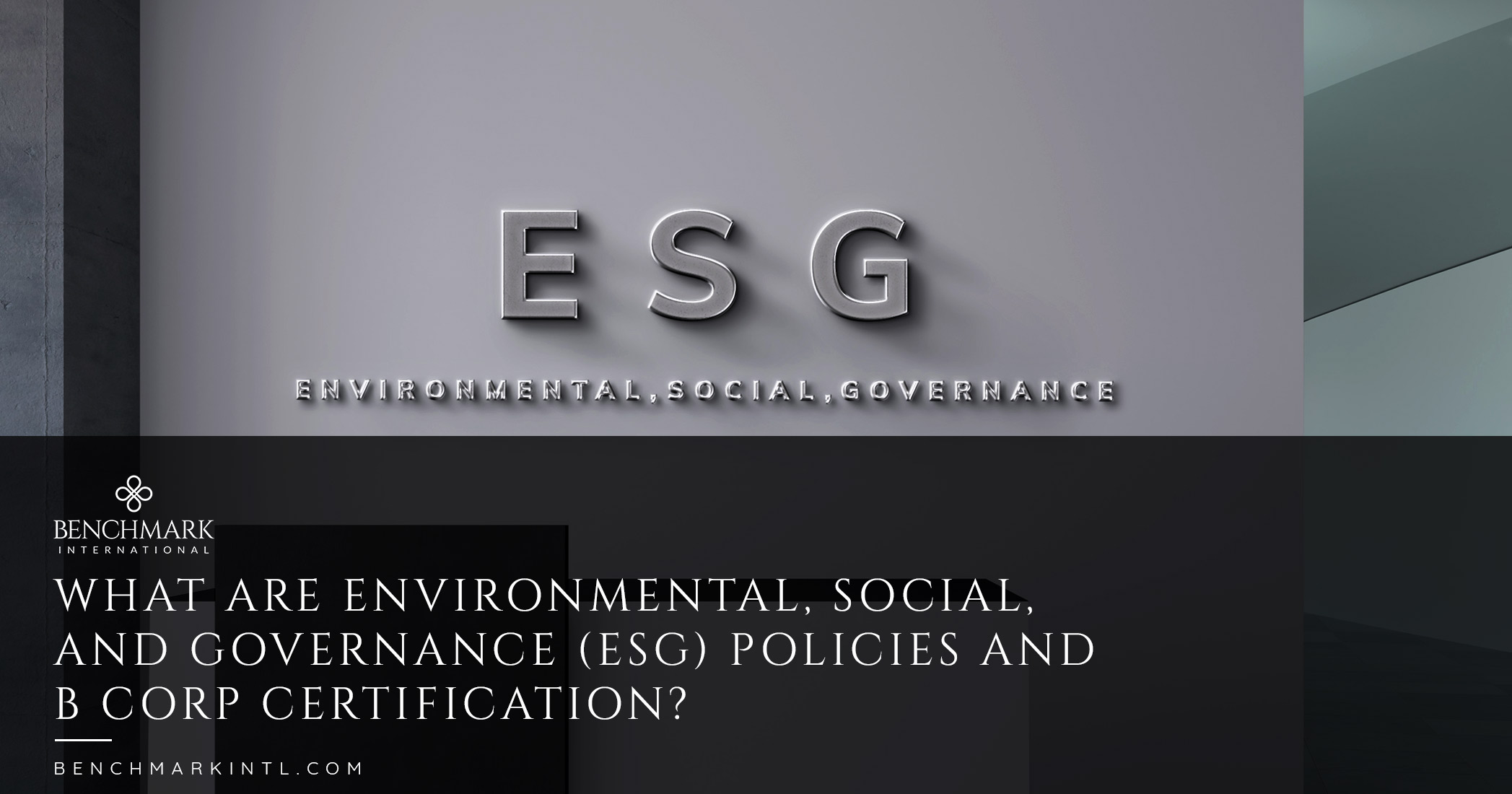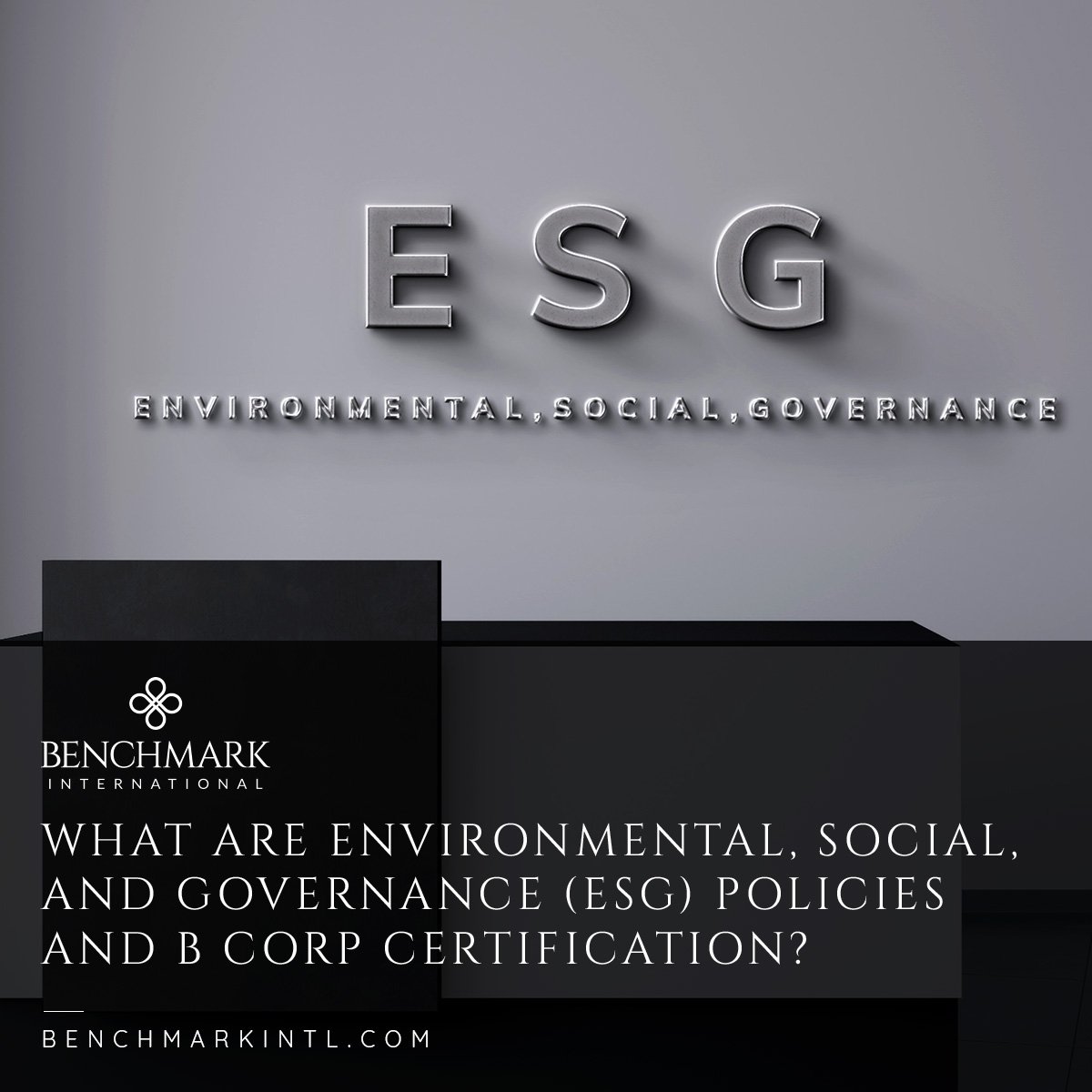
As a business owner, you may have noticed an increase in conversations regarding environmental, social, and governance (ESG) policies in the workplace and B Corp status. Even though these policies are being implemented more frequently with larger companies, many small and mid-size business owners are not fully aware of what these policies are, what they mean, and how they are affecting investor behavior and M&A transactions. Let’s start by breaking down exactly what ESG is.
Environmental
The environmental segment of ESG assesses the ways that a company’s practices impact the Earth’s environment regarding issues such as:
- Pollution, emissions and carbon footprint
- Conservation
- Energy and raw material resource use
- Biodiversity and land use
- Toxic waste, packaging material waste, electronic waste
- Climate change
- The humane treatment of animals
- Innovation to support these policies
ESG strategies are also employed to gauge any environmental risks to the company and how it can best mitigate those risks.
Social
ESG’s social standards are rooted in optimizing the ways that a company manages its relationships with everyone, from customers and the community to employees and vendors. These social aspects include:
- Worker health and safety protocols
- Employee compensation and benefits
- Workplace policies to prevent sexual harassment and prejudice
- Supply chain labor standards
- Adhering to the values that the business projects
- Community relations
- Donating to a charity or working with charitable organizations
- Supporting human rights and certain social movements
- Producing products responsibly
- Privacy and data security
- Responsible investing
Governance
Governance under ESG is all about keeping leadership above board. It holds the company’s upper management, culture, values, accounting methods, and stockholders to higher standards. Basically, governance policies are put in place to keep a company ethical and aligned with the goals of diversity, equity, inclusion, and fair compensation. These policies can also involve provisions to avoid issues such as conflicts of interest, excessive executive bonuses, and anything that can be considered illegal, fraudulent, or corrupt.
ESG and Investments
ESG standards are reshaping behaviors in the investment community. More investors are looking at a company’s ESG policies when deciding where they want to put their money, especially younger investors who want investments that match their own values. This is happening alongside corporate leadership that has gotten on board with the idea that they need to treat both the planet and their workers with more respect and responsibility. Additionally, investors are giving more focus to sectors and regions that are in a more resilient and competitive position to do well in a low-carbon world.
Investors flowed a record $649 billion into ESG funds during the first 11 months of 2021. That’s up from the $542 billion invested in 2020 and $285 billion in 2019. And, over the last five years, ESG stocks outperformed the market by 88%. Growth in ESG investing is expected to increase in 2022 and beyond.
In 2020, 88% of publicly traded companies, 79% of venture and PE-backed companies, and 67% of privately-owned companies had implemented ESG strategies. And that was two years ago. Other data indicates that ESG-mandated assets could account for half of all professionally managed investments by 2025, at a total of $35 trillion.
ESG and Company Valuations
ESG considerations are also impacting company valuations. The issues are becoming more prevalent in society and the corporate world, and studies have shown that the effective implementation of ESG strategies can increase business value. This is because ESG can directly affect financial performance and risk mitigation in various ways.
Growth
When ESG initiatives are done right, they can help a company expand in both existing and new markets. Consumer preferences are changing. Many report that they would pay more for a product or service from a company with better environmental policies. In fact, one study revealed that 76% of consumers said they will no longer buy from companies that treat the environment, their employees, or their community poorly.
In another study, 44% of companies surveyed reported that business and growth opportunities were their motivation for implementing ESG. Additionally, when a company has proven to be good stewards of the planet, they are more trusted by authorities, making it more likely that they can gain access, approval, and licenses needed for growth.
Lower Costs
ESG standards have been shown to greatly reduce costs for a company because the measures can offset rising operating expenses and material costs, and boost resource efficiency and financial performance. The more aggressive the ESG strategy, the more cost-effective it can be. Cost-benefit analyses and economic impact analyses can be used to guide a company’s ESG investments. According to research, ESG strategies can impact operating profits by as much as 60%.
Employee Productivity
ESG initiatives have been proven to attract and retain talent, improve morale, and boost productivity. Employee satisfaction is directly correlated with shareholder returns and better performance. Studies show that positive social action is directly linked to higher job satisfaction. Employees want their workplaces to give back. One study showed that companies that had the highest employee satisfaction also had ESG scores 14% higher than the global average. At the same time, a lacking ESG strategy can damage employee productivity. This is more important than ever, considering the widespread labor shortages that the world has faced as of late.
Higher ROI
ESG policies can enhance a company’s investment returns by flowing capital to more favorable and sustainable areas. It can also help dodge investments that are less likely to pay off because of long-term environmental factors. Companies are pivoting away from energy-hungry factories and equipment because of the costs. And regulatory measures are increasing surrounding ESG standards. Investing a little more money today could save your business a lot more money tomorrow.
Less Regulatory Pressure
Having ESG strategies in place can help to take off regulatory pressure and government interference. It can also garner more regulatory support. Some sectors—such as banking, technology, aerospace and defense, healthcare, and pharmaceuticals—tend to face more regulations. Companies that show they are committed to ESG policies can foster trust and lessen the scrutiny they face. There are also more energy tax incentives and credits in today’s world that a company can benefit from.
ESG Ratings and Reporting
There are ESG ratings agencies that use data to assess, measure, and compare companies’ ESG performance. Examples include the MSCI ESG Fund Ratings, ESG Score, Nasdaq OneReport, and S&P Global Ratings. There is also something known as ESG reporting, under which companies must present data from financial and non-financial sources showing that they meet the standards of agencies such as the Sustainability Accounting Standards Board, the Global Reporting Initiative, as well as the Task Force on Climate-related Financial Disclosures.
ESG and Financing
Lenders have recognized the potential impacts of ESG risks on the creditworthiness of companies. Sustainability-linked financing is lowering the cost of capital for businesses that commit to better ESG performance. Less costly financing could make ESG success stories more desirable M&A targets.
ESG and M&A
M&A strategies are being used more frequently in order to improve the company’s ESG initiatives more quickly. Also, ESG factors are being used more often to scrutinize M&A deals. ESG deals soared to $120 billion in 2021, up from $92 billion in the entire year of 2020.
As priorities continue to shift, companies that embrace ESG in M&A are going to be in a better position for growth. They will have a competitive edge, less risk, and better access to affordable capital. ESG is also increasingly important to gaining stakeholder trust when it comes to a company’s ability to sustain success and profitability into the future. To succeed with ESG in M&A, companies should be focused on strategic alignment, execution, due diligence, and long-term value creation. Both buyers and sellers will need to seek out synergies that can come from companies with aligned ESG profiles.
B Corporation Certification
Also referred to as B Lab or B Corp, B Corporation is a third-party certification obtained by companies that recognizes their social and environmental performance, accountability, and transparency. Businesses are assessed on their positive impact on areas of governance, their employees, their community, the environment, and the product or service they provide. They are expected to meet the highest standards in these areas and maintain their commitment to all stakeholders, including employees and their local communities. By committing to stakeholders and not just shareholders, B Corps show that they are focused on more than just making money—they make concerted efforts to protect ESG principles.
The certification is given by the global nonprofit, B Lab. Their mission is, “Transforming the global economy to benefit all people, communities, and the planet.” In order to be awarded and keep B Corp status, companies must meet certain criteria:
- A minimum score of 80 out of 200 from an online assessment of social and environmental performance
- Integration of B Corp commitments to stakeholders in company by-laws and furnishing of supporting documentation
- Payment of an annual fee based on annual sales
- Companies must recertify every three years
Sustainability has become a much larger priority for investors in recent years because ESG funds have proven to outperform conventional counterparts, and they mitigate risk because they are managed better. So, how are investors engaging with B Corps? Some are certified as B Corps themselves, including venture capital firms, private equity firms, wealth managers, impact investors, and private banks. Some are using the B Impact Assessment to reassess their portfolios. Corporate mergers and acquisitions departments are bringing B Corps in-house. Many are making direct investments into B Corps. Investors are also following the performance analyses of these companies and funding them.
As more and more multinational corporations are pledging to work only with sustainable suppliers, a great deal of value is added for those that are B Corps.
B Corps were incepted in 2007, and there are more than 3,500 B Corps in over 70 countries worldwide today.
Americas: Sam Smoot at +1 (813) 898 2350 / Smoot@BenchmarkIntI.com
Europe: Michael Lawrie at +44 (0) 161 359 4400 / Lawrie@BenchmarkIntl.com
Africa: Anthony McCardle at +27 21 300 2055 / McCardle@BenchmarkIntl.com
ABOUT BENCHMARK INTERNATIONAL:
Benchmark International’s global offices provide business owners in the middle market and lower middle market with creative, value-maximizing solutions for growing and exiting their businesses. To date, Benchmark International has handled engagements in excess of $8.25B across various industries worldwide. With decades of global M&A experience, Benchmark International’s deal teams, working from 14 offices across the world, have assisted thousands of owners with achieving their personal objectives and ensuring the continued growth of their businesses.
Website: http://www.benchmarkintl.com
Blog: http://blog.benchmarkcorporate.com

 Benchmark International
Benchmark International  Benchmark International
Benchmark International 





